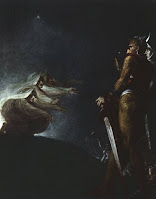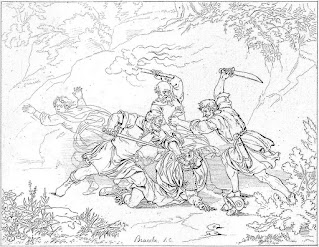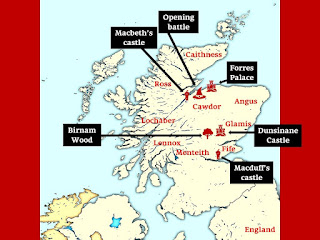It wasn’t an elaborate murder plot, nor did it go as planned. Not Macbeth’s plan, anyway. He put real thought into it, though. Ambushing his best friend Banquo outside Forres Castle required not one, not two, but three bushwhackers. What happens next is a Shakespeare whodunnit.
Macbeth (or The Scottish Play, for the superstitious) up to this point: Scotland is thunder and fog and war. The ever-hovering Weird Sisters have prodded general Macbeth's ambition with a prophecy that he'll rule Scotland. And Macbeth does, by killing his cousin and legit king, Duncan, and escaping blame with help from Lady Macbeth. But this power couple has a problem: The Weird Sisters also foretold that Banquo's heirs would assume the crown. The Weird Sisters are yet to be wrong. If Macbeth wants to hold and pass that crown, Banquo and his son Fleance's brief candles need snuffing.
Opportunity knocks at Forres Castle, Duncan's old palace. Macbeth freed up everyone's afternoon to relax before a self-congratulatory banquet that night. In actuality, he wants to catch a target alone. Banquo and Fleance, there at court, plan a conveniently lonely ride upon the heath before the banquet. It’s an odd move to leave the relative safety of the other thanes, what with Banquo--and most everyone else--not fooled by Macbeth’s bloody power grab. Banquo must feel most secure keeping himself and Fleance clear of Macbeth.
With cause. Ahead of the ambush, Macbeth tells Murderers One and Two:
I will advise you where to plant yourselves;
Acquaint you with the perfect spy o' the time,
The moment on't — for't must be done tonight
And something from the palace, always thought
That I require a clearness.
With Banquo connected and well-respected, Macbeth needs the job to go perfectly, but he's condescending at best to his crew already onboard. This new op is who Macbeth trusts, someone who knows the local ground and Banquo's riding habits, where he must dismount and walk his horse for the stables.
Enter Third Murderer. It's Third Murderer who positions the bushwhack while First and Second complain about Macbeth’s obvious lack of faith. They have no idea who this new accomplice is, nor is Third Murderer volunteering a name. It’s Third Murderer who spots Banquo, but Fleance scarpers off unwhacked into the heath. Third Murderer notices that, too.
Macbeth never identifies this perfect spy o’ the time. Third Murder just murders thirdly. The simplest theory: Read no critical meaning into this. Often, Shakespearian parts were tossed in to reposition the stage post-scene. But Third Murderer stalks the enduring 1623 script so trusted but so anonymous as if a clue. After all, if the production needed an extra hand to clear the heath, Macbeth could've hire a trio.
 |
| Henry Fuseli |
And the play does need a trio. In Macbeth as in life, what's bad comes in threes. Ghostly knocks, incantations, murders on stage (Duncan, Banquo, Macduff’s son). Three was the unluckiest number in Shakespeare’s England. Third Murderer perfecting yet another unholy trinity amps the supernatural unease.
Third Murder perfects something more important: dramatic structure. Up to Fleance's scarpering, everything clicks for Macbeth. He won fame, avoided justice, taken the crown, and consolidated power. After Fleance scarpers, Macbeth suffers desertion and defeat. His hand-picked asset proves imperfect or at least inexpert– Macbeth's pivotal miscalculation and core to the play's message: Rulers turned tyrants will inevitably self-destruct.
Who, then, might be our imperfect spy o' the time?
LENNOX
The thane Lennox tracks after whoever is king. Lennox stays at court longest among the thanes, long after the most forthright have defected to the opposition cause. After Banquo's murder, Macbeth brings Lennox along for a final consultation with the Weird Sisters.
Lennox didn't, however, have motive. He may keep hanging around the palace, but not as a friend to Macbeth. Lennox is repeatedly sarcastic about Macbeth's suspicious rise and Scotland's trail of too-convenient deaths. Soon enough, Lennox joins the rebellion. It's unlikely he seeks or finds welcome there if he third-murdered Banquo.
ROSS
 |
| © Wikipedia |
Joel Coen's 2021 movie re-fashions the thane Ross as Third Murderer. It's not the first such interpretation. Ross, a cousin both to Macbeth and poor Duncan, is a wheeler-dealer, in on court gossip and happy to run errands for the crown. The Coen movie fashions Ross into a ruthless king-maker. The botched murder of Fleance intentionally furthers his own ambitions.
A cool take– that doesn't quite jive. In the First Folio (admittedly compiled some 17 years after Macbeth was first staged), Ross breaks with Macbeth early. Ross warns Lady Macduff to flee, at some risk to himself, and Ross tells Macduff about his family's assassination. Ross helps secure English forces to unseat Macbeth. Why murder for a tyrant while tipping everyone else to the body trail?
A DUBIOUS ASSOCIATE
Macbeth was a successful warrior thane prior to the Weird Sisters' appearance. He would've had a network of useful associates and willing mercenaries. Third Murderer as a random agent moves the play along, but Macbeth is also about specific choices leading to specific fates. Even First and Second Murderer get a scene to choose their dark path of revenge for perceived insults off Banquo. It's too loose a thread if Third Murderer is just a mercenary.
SEYTON THE ARMORER GUY
The Scottish-English alliance creeping up forest-style on Macbeth also vow to punish his "cruel ministers." The play shows one such official around for the final battle: Macbeth's attendant and armorer, Seyton. He is introduced late--at the Act V climax--and with little ado. He seems there mostly to provide Macbeth updates on the crumbling situation. But Seyton is all-in with Team Macbeth. His rise to captain might've been launched as a trusted bushwhacker.
A CONJURING
Scotland grows full of eerie happenings as the Weird Sisters run amok. It would've hardly been past the Sisters to place a malevolent entity at Macbeth's disposal. Or perhaps Scotland's hauntings reach a critical mass and conjure their own demons. It's all possible in Macbeth's story world, and such an entity would've seen that fated characters met fated ends: death for Banquo, escape for Fleance, doom for Macbeth. Still, Macbeth had a known someone in mind for third murdering. A random ghoul doesn't inspire the requisite trust.
LADY MACBETH
 |
| John Singer Sargent, 1889 (Tate Gallery) |
To here, Lady Macbeth has been clinical and composed about murder. This woman turned to direst cruelty is, at last, someone Macbeth could believe reliable at so great a task.
Directly before the bushwhacking attempt, though, she is at Forres Castle with Macbeth, who hints that it's a shame what might happen to Banquo. Macbeth leaves her with plausible deniability, and he's not interested in discussing her emerging reticence for bloodshed. We next see her entering the banquet with the royal entourage. By all evidence, she stuck to the castle and kept, ahem, her hands clean.
Then, there's theme. Macbeth is overt about gender roles. Lady Macbeth vows to “unsex” herself when she helps murder Duncan. The Weird Sisters are feared doubly for how they defy expectations of womanhood. Even if somehow First and Second Murderers didn't recognize the dang queen as Macbeth's perfect spy o' the time, they would’ve noticed something feminine or unsexed about this new partner.
MACBETH
By this point, Macbeth keeps his own counsel. He came to the throne by violence, and violence to hold power is fine by him. More than anyone, he knows old pal's Banquo’s habits and formidable skills in a fight. A direct part in Banquo's death would further explain Macbeth's sanity break when Banquo's ghost appears--only to Macbeth--at the feast.
But Macbeth, too, arrives at the feast on time and unruffled. If he did slip away and return under the wire, he has to feign surprise when First Murderer reports Fleance's feet-don't-fail-me-now escape. Like Lady Macbeth, though, it’s farfetched to imagine First and Second Murderer not recognizing the king even disguised. They don’t, either overtly or by inference, and as a practical matter, First Murderer wouldn't risk reporting to Macbeth what the boss witnessed in person.
SHAKESPEARE
That's right. The Bard pulled it off. He wrote in Third Murderer with such brilliant vagueness that production options were wide open.In a play about ambition and abuse of power, the suspect list is half the cast. It’s a testament to Macbeth's power that five centuries later we're still sifting through the couldadunnits.



Thanks for an entertaining blog about a favorite Shakespeare play!
ReplyDeleteOh, Bob! Great post. James Thurber, in his "The MacBeth Murder Mystery", solved it by making Lady Macbeth's father the Third Murderer, as well as the one who "really" went in and killed Duncan (arguing that MacBeth was way too hysterical to have done it himself).
ReplyDeleteI love that story! I think the woman in the story went on to say that DUNCAN was Lady Macbeth's father?
DeleteI was going to mention Thurber's solution, but Eve beat me to it. But here's a link:
ReplyDeletehttp://userhome.brooklyn.cuny.edu/anthro/jbeatty/COURSES/Macbeth/thurber.htm
Double, double toil and trouble.
ReplyDeleteFire burn and caldron bubble.
That's forever stuck in my brain. I enjoyed the article, Bob, and the spreadsheet summary is great. Well done.